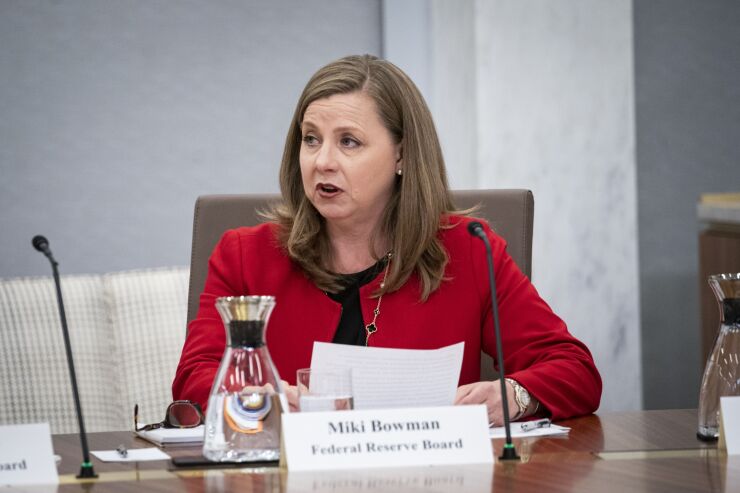Regulators are keeping a skeptical eye on cryptocurrencies, but at least one official wants to make sure digital assets are not driven from the banking sector entirely.
Federal Reserve Governor Michelle Bowman said banks should be allowed to experiment with crypto currencies and efforts to mitigate risks related to this type of activity should not go so far as to drive it out of the supervised space altogether.
"The Fed and other banking agencies will continue to focus in this area, in light of the significant risks these activities may pose. But the bottom line is that we do not want to hinder innovation," Bowman said Tuesday afternoon in prepared remarks delivered at a Florida Bankers Association event. "As regulators, we should support innovation and recognize that the banking industry must evolve to meet consumer demand."

Bowman's comments come a week after the Fed, Federal Deposit Insurance Corp. and the Office of the Comptroller of the Currency issued a joint statement on supervising crypto risks. In it, the agencies noted their "significant safety and soundness concerns" about banks providing credit to crypto firms. They also said it would be "highly unlikely" that banks would be allowed to hold cryptocurrencies or other assets that are traded on decentralized platforms on their balance sheets.
Bowman acknowledged the events of the past year, including the demise of the
Still, she said, as regulators consider policy changes, they also need to consider the risks of going too far.
"By inhibiting innovation, we could be pushing growth in this space into the non-bank sector, leading to much less transparency and potential financial stability risk," she said. "We are thinking through some of these issues and what a regulatory approach could look like."

In her speech, Bowman also addressed several other regulatory objectives on the Fed's agenda for 2023, including payments, climate-related risks and the finalization of reforms to the Community Reinvestment Act.
Bowman said FedNow, the real-time payment processing network that is set to debut this year after years of anticipation, will be transformative, allowing "depository institutions of every size, and in every community across America, to provide safe and efficient instant payment services."
Currently, the only option for instant payment processing is the Real Time Payments Network, a private system run by The Clearing House, an organization that is owned by several of the top banks in the country. While FedNow will be offered at a discounted rate during its initial rollout this summer,
Bowman noted that when FedNow makes its debut, it could provide many of the innovations some advocates say could be derived from a central bank digital currency. While the idea of a CBDC
"The Fed continues to study the idea, although much of what supporters hope to achieve with a central bank digital currency may be provided through FedNow and existing private payment services," Bowman said. "In any case, initiatives to make payments faster and more efficient will continue to be an area of focus."
Bowman, often a proponent of less-intrusive regulation, especially for smaller and community banks, said recent initiatives around climate-risk assessment adhere to the Fed's long-running principles.
The central bank will run a pilot stress test program this year that will evaluate the ability of six of the largest banks in the country to deal with climate-related events. It has also proposed guidelines on how to deal with climate risks for banks with at least $100 billion of assets. Bowman noted that smaller banks were spared from these initiatives, in part, because they "already integrate and comply with robust risk management expectations."
Overall, Bowman said the Fed's new climate initiatives are largely extensions of existing practices.
"The Fed views its role on climate as a narrow focus on supervisory responsibilities and limited to our role in promoting a safe, sound and stable financial system," she said. "While this climate supervision effort is a new area of focus, it has been a longstanding supervisory requirement that banks manage their risks related to extreme weather events and other natural disasters that could disrupt operations or impact business lines."
Finally, Bowman reiterated her concerns about proposed changes to the Community Reinvestment Act, which is being updated for the first time in 25 years. In May, when the Fed
"I am fully supportive of these efforts, but I also share the concern noted in public comments that have suggested that some of the elements included in this overhaul of the CRA framework result in significant new regulatory burden, particularly for the smallest and community banks," she said Tuesday. "As we continue this important rulemaking process, it will be critical for the Fed to carefully weigh the costs and benefits of any changes before finalizing a proposal."





